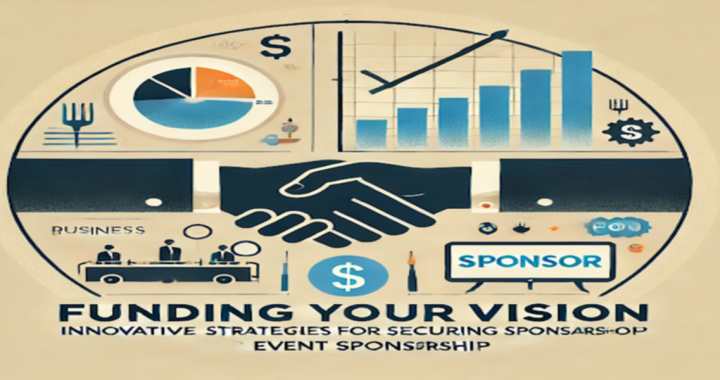Securing sponsorship is a critical aspect of successful event planning, offering both financial support and valuable partnerships.Read More
Before reaching out to potential sponsors, clearly define what you need from a sponsorship. This involves understanding both your financial requirements and the type of support that will benefit your event. Consider whether you need funding, in-kind contributions, promotional support, or a combination of these. For instance, if you’re organizing a local arts festival, your needs might include funding for venue costs, in-kind donations such as art supplies, and promotional support to increase event visibility. Clearly outlining these needs will help you identify and approach the right sponsors who align with your requirements. Start by identifying organizations that align with your event’s goals and target audience. Research companies and brands that have sponsored similar events or that have a vested interest in your event’s theme. Look for sponsors whose values and mission align with your event’s purpose. For example, if you’re hosting a health and wellness expo, potential sponsors could include fitness brands, health food companies, and wellness centers. Identifying these sponsors involves researching their past sponsorships, understanding their marketing strategies, and evaluating their relevance to your event. A well-crafted sponsorship proposal is essential in attracting potential sponsors. Your proposal should clearly articulate the value of the sponsorship, including the benefits for the sponsor, such as brand exposure, audience engagement, and unique promotional opportunities. Include key details in your proposal: Building strong relationships with potential sponsors is crucial for securing their support. Establishing a connection and demonstrating genuine interest in their business can make a significant difference. Engage with potential sponsors through networking events, industry conferences, and social media. Personalize your outreach and show how a partnership with your event aligns with their marketing goals. Building rapport and understanding their business objectives will increase the likelihood of securing their support. Customizing sponsorship packages to meet the specific needs of potential sponsors can be highly effective. Tailored packages demonstrate that you’ve considered their interests and are willing to create a mutually beneficial arrangement. For example, if a potential sponsor is a local brewery, offer a sponsorship package that includes opportunities for them to showcase their products at your event, such as exclusive tasting stations or branded areas. Tailoring packages shows flexibility and an understanding of what will appeal to the sponsor. Showcasing previous successful sponsorships or providing testimonials from past sponsors can enhance your credibility and demonstrate the value of partnering with your event. Case studies and testimonials provide evidence of how your event has positively impacted sponsors in the past. For instance, if you’ve previously partnered with a well-known company, include a testimonial from their marketing team highlighting the positive outcomes of the sponsorship. This adds credibility and reassures potential sponsors of the benefits they can expect. Digital platforms offer a cost-effective way to reach potential sponsors and build relationships. Utilize social media, email marketing, and your event’s website to connect with brands and organizations. Create engaging content that showcases the value of your event and the opportunities for sponsorship. Share success stories, event updates, and sponsorship benefits to attract and engage potential sponsors. After your initial outreach, follow up with potential sponsors to keep the conversation going. Regular communication helps in building relationships and demonstrates your commitment to the partnership. Send personalized follow-up emails, provide updates on the event, and offer to answer any questions they may have. Maintaining open communication and being responsive to their needs helps build trust and increases the likelihood of securing their support. Securing reliable event sponsorship involves a strategic approach that includes understanding your needs, identifying suitable sponsors, crafting compelling proposals, and building strong relationships. By offering tailored sponsorship packages, demonstrating value through case studies, leveraging digital platforms, and maintaining communication, you create a solid foundation for successful sponsorship partnerships. With these innovative strategies, you can attract and secure sponsors that align with your event’s vision, ensuring both financial support and valuable promotional opportunities.Understanding Your Sponsorship Needs
Identifying Potential Sponsors
Crafting a Compelling Sponsorship Proposal
Building Strong Relationships
Offering Tailored Sponsorship Packages
Demonstrating Value Through Case Studies and Testimonials
Leveraging Digital Platforms for Outreach
Following Up and Maintaining Communication
Conclusion

